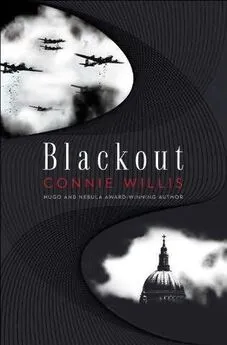Connie Willis - Blackout
- Название:Blackout
- Автор:
- Жанр:
- Издательство:неизвестно
- Год:неизвестен
- ISBN:нет данных
- Рейтинг:
- Избранное:Добавить в избранное
-
Отзывы:
-
Ваша оценка:
Connie Willis - Blackout краткое содержание
In her first novel since 2002, Nebula and Hugo award-winning author Connie Willis returns with a stunning, enormously entertaining novel of time travel, war, and the deeds—great and small—of ordinary people who shape history. In the hands of this acclaimed storyteller, the past and future collide—and the result is at once intriguing, elusive, and frightening.
Oxford in 2060 is a chaotic place. Scores of time-traveling historians are being sent into the past, to destinations including the American Civil War and the attack on the World Trade Center. Michael Davies is prepping to go to Pearl Harbor. Merope Ward is coping with a bunch of bratty 1940 evacuees and trying to talk her thesis adviser, Mr. Dunworthy, into letting her go to VE Day. Polly Churchill’s next assignment will be as a shopgirl in the middle of London’s Blitz. And seventeen-year-old Colin Templer, who has a major crush on Polly, is determined to go to the Crusades so that he can “catch up” to her in age.
But now the time-travel lab is suddenly canceling assignments for no apparent reason and switching around everyone’s schedules. And when Michael, Merope, and Polly finally get to World War II, things just get worse. For there they face air raids, blackouts, unexploded bombs, dive-bombing Stukas, rationing, shrapnel, V-1s, and two of the most incorrigible children in all of history—to say nothing of a growing feeling that not only their assignments but the war and history itself are spiraling out of control.
Blackout - читать онлайн бесплатно полную версию (весь текст целиком)
Интервал:
Закладка:
It is going to peter out in a field, she thought. I must have come the wrong way.
No, wait, there was the manor’s gateway ahead, with its stone pillars and wrought-iron gate. And a sentry box, complete with a bar to keep vehicles out. And a uniformed sentry.
“State your name and business,” he said.
“I’m Miss Sebastian. I was looking for someone, but I must have come the wrong way. I was trying to find the manor.”
“This is it. Or was. Now it’s the Royal Riflery Training School.”
And it was a good thing she hadn’t tried to find the drop on her own. She might have been shot. “When-how long has the school been here?”
“I’m afraid you’ll have to ask Lieutenant Heffernan that. I’ve only been here two weeks.”
“You don’t know if any of the staff stayed on after the manor was taken over, do you?”
“You’ll have to ask Lieutenant Heffernan.” He stepped back into the sentry box and picked up the telephone. “A Miss Sebastian to see Lieutenant Heffernan. Yes, sir,” he said. He hung up and came back out. “You’re to go up.” He raised the bar so she could pass through. “Follow the drive up to the house and ask for Operations.” He handed her a pasteboard visitor’s pass. “It’s just through there,” he said, pointing between a pair of new-looking barracks.
“Thank you,” Polly said and started up the gravel drive, even though there was no point. Merope’s assignment had obviously ended with the takeover of the manor. Unless the remaining evacuees had been transferred to another village and she’d gone with them. But Lieutenant Heffernan couldn’t tell her anything about the evacuees.
“I didn’t arrive till after the school was in operation,” he said.
“When did the Army take over the manor?”
“August, I believe.”
August. “Did any of the staff stay on here?”
“No. Some of them may have gone with the lady of the manor. I believe she went to stay with friends.”
In which case she’d only have taken her personal maid and chauffeur.
“I can give you her ladyship’s address,” he said, looking through a stack of papers. “It’s here somewhere…”
“No, that’s all right. Do you know if the evacuees who were here returned home or were billeted somewhere else?”
“I’m afraid I don’t. I believe Sergeant Tilson was here then. He might be able to help.”
But Sergeant Tilson hadn’t been there either. “I didn’t come till September fifteenth, and the evacuees had already gone back to their parents by then.”
“To their parents? In London?”
He nodded.
Then Merope definitely hadn’t gone with them. “What about the staff?”
“From what Captain Chase said, they went home to their families as well.”
“Captain Chase?”
“Yes. He was in charge of setting up the school. He’d be able to tell you-he was here when they all left-but I’m afraid you just missed him. He left for London early this morning and won’t be back till Tuesday.” He frowned. “The vicar in the village might be able to tell you where they went.”
If I can find him, Polly thought. But if she could make it back to Backbury before eleven, he’d be at the church, preparing for the service. She quickly took her leave of the sergeant-and the sentry, who solemnly raised the bar again to let her out-and hurried back along the road.
It was already past ten. I’ll never make it walking, she thought, and it was too far to run. And just outside the gate, it began to rain in earnest, turning the lane into a muddy mire. She had to stop twice to scrape the caked mud off her shoes with a stick.
They’ll already be in church, she thought when she finally splashed into the village. She spotted the vicar, half running, half walking along the side of the church toward the vestry door, clutching a sheaf of paper, his robe flying out behind him.
“Vicar!” she called, running after him. “Vicar!” Or was he the vicar? Now that she grew closer, he looked awfully young. Perhaps he was the choir director, and those papers were the morning’s anthems. “Sir! Wait!”
She caught up to him just as he was going in. “What is it, miss?” he said, his hand on the half-open vestry door. His eyes swept over her damp hair, her muddy shoes. “What’s happened? Has there been an accident?”
“No,” she said, out of breath from running. “I’ve just been out to the manor. I came in on the bus this morning-”
“Vicar!” A small boy poked his head out of the half-opened door. “Miss Fuller said to tell you they’ve finished the prelude.” He tugged at the vicar’s sleeve.
“Coming, Peter,” he said, and to Polly, “Has something happened at the riflery school?”
“No. I only wanted to ask you a question. I-”
“It’s time for the invocation,” Peter hissed.
“I must go,” the vicar said regretfully, “but I’ll be glad to speak with you as soon as the service is over. Would you care to join us?”
“Vicar, it’s time!” Peter said, and dragged him into the church.
And that’s that, Polly thought and walked out to the station to wait for the train. Unless the stationmaster knows where the evacuees have gone.
But he’d apparently spent the last three hours drinking. “Whaddya want?” he demanded, and it was obvious he didn’t recognize her from this morning.
“I’m waiting for the 11:19 to London.”
“Won’t be here f’r ’ours,” he said, slurring his words. “Bloody troop trains. Always late.”
Good. She could go back to the church, wait for the end of the service, and ask the vicar after all. And if the 11:19 was as late as every other train she’d been on, she could also ask everyone else in the village. She hurried back to the church through the rain and slipped into the back of the sanctuary.
Only the first few rows of pews had people in them-several white-haired ladies in black hats, a handful of balding men, and young mothers with children. They were just finishing singing “O God, Our Help in Ages Past.” Polly tiptoed in and sat down in the last pew.
The vicar looked up from his hymnal and smiled welcomingly at her, and one of the white-haired ladies, who looked like a cross between Miss Hibbard and Mrs. Wyvern, turned around and glared. Miss Fuller, no doubt.
She’s the person I should speak with, Polly thought. The captain had suggested the vicar, but she doubted if he were on intimate terms with the hired help at the manor. But this was a tiny village. Miss Fuller and the other elderly women would know all the comings and goings of everyone. If Polly could get past that disapproving glare.
But even if she couldn’t, the boy Peter was likely to know about the evacuees, or could at least point out the schoolmistress to her. She’d be certain to know. And in the meantime, if it wasn’t exactly warm in the sanctuary, it was at least dry, and hopefully the vicar’s sermon wouldn’t be too long, though she doubted it from the thickness of his sheaf of papers, which he was now arranging on the top of the pulpit.
He finished arranging them and gazed out over the congregation. “The Scriptures say that our true home is not in this world, but the next, and that we are only passing through…”
Truer words, Polly thought.
“Thus it is with this war,” he said. “We find ourselves stranded in an alien land of bombs and battles and blackouts, of Anderson shelters and gas masks and rationing. And that other world we once knew-of peace and lights and church bells chiming out over the land, of loved ones reunited and no tears, no partings-seems not only impossibly distant, but unreal, and we cannot quite imagine ourselves ever getting back there. We mark time here, waiting…”
For church to be over, for the train to arrive, for the retrieval team to come, Polly thought. The vicar’s sermon was cutting a little too close to the bone. Why couldn’t he have preached on begats or something?
“… hoping that this ordeal will pass, but secretly fearing that we shall never see that land of milk and honey-and sugar and butter and bacon-again. That we will be trapped in this dreadful place forever-”
A whistle cut sharply across his words. Peter got onto his knees to look out the window, and Miss Fuller glared at him. Polly looked down at her watch: 11:19. The train. But the stationmaster had said it was always late.
It’s another troop train, she thought, but she could already hear it slowing.
“Just as we have faith that one day the war will be over,” the vicar said, “we have faith that one day we shall attain heaven. But just as we cannot hope to win this war unless we ‘do our bit’-rolling bandages, planting Victory gardens, serving in the Home Guard-so we cannot hope to attain heaven unless we also do our bit-”
Polly hesitated, caught in an agony of indecision. This was today’s only train, and the bus wouldn’t come till after five. If it was on time.
But someone here might know where Merope went. You know where she went, Polly thought, and you know what they’ll tell you. That all the evacuees went back to London and she left as soon as they were gone. She’s been back in Oxford for weeks. Which means her drop isn’t working anymore, and even if it was, you don’t know where it is and can’t get to it without being shot at, so there’s no point in staying here.
And if you miss that train, there’ll be no way you’ll make it back to London before Tuesday-or Wednesday-and Marjorie can’t cover for you forever. You’ll lose your job, and when the retrieval team comes, they won’t be able to find you.
“We must act-” the vicar said. The whistle, much closer, blew again.
Polly stood up, shot the vicar an apologetic glance, opened the church door, and ran for the train.
Those in the convent are desperate.
– CODED MESSAGE TO THE FRENCH RESISTANCE, 5 JUNE 1944War Emergency Hospital-September 1940
MIKE HAD HAD NO IDEA ANYONE WAS SITTING THERE IN the high-backed wicker chair. When the voice said, “I thought you were supposed to keep your weight off that foot, Davis,” it startled him so much he let go of the chair back, came down full on his bad foot, nearly fell, and had to clutch wildly at the potted palm to stay upright.
At the same time, a wild hope surged through him. It’s the retrieval team, he thought. Finally.
The man was wearing the hospital-issue pajamas and maroon bathrobe, but he could have gotten those from Wardrobe. “Patient” would be a perfect disguise for getting into the hospital, and he was the right age for an historian. And he’d waited till they were alone in the sun-room to speak.
“Sorry, old man, I didn’t mean to give you a fright,” he said, leaning over the arm of the chair to smile at Mike.
“You know my name,” Mike said.
“Oh, right, we haven’t been properly introduced, have we?” He extended his hand. “Hugh Tensing. I’m on the third floor.”
And you’re not the retrieval team, Mike thought. Now that he looked closer, he saw Tensing was much too thin, and he had the drawn, strained look of an invalid.
“You’re Mike Davis, the American war correspondent,” Tensing was saying. “You repaired a broken propeller with your bare hands and single handedly rescued the entire BEF, according to Nurse Baker. She can’t stop talking about you.”
“She’s wrong,” Mike said. “The propeller wasn’t broken. It was just fouled, and all I did was pull-”
“Spoken like a true hero,” Tensing said. “Modest, humble even though you were injured in the line of duty-”
Читать дальшеИнтервал:
Закладка:

![Jane_BlackCat - Понять не поздно... [СИ]](/books/1148838/jane-blackcat-ponyat-ne-pozdno-si.webp)
![Jane_BlackCat - За краем Вечности [СИ]](/books/1148839/jane-blackcat-za-kraem-vechnosti-si.webp)

